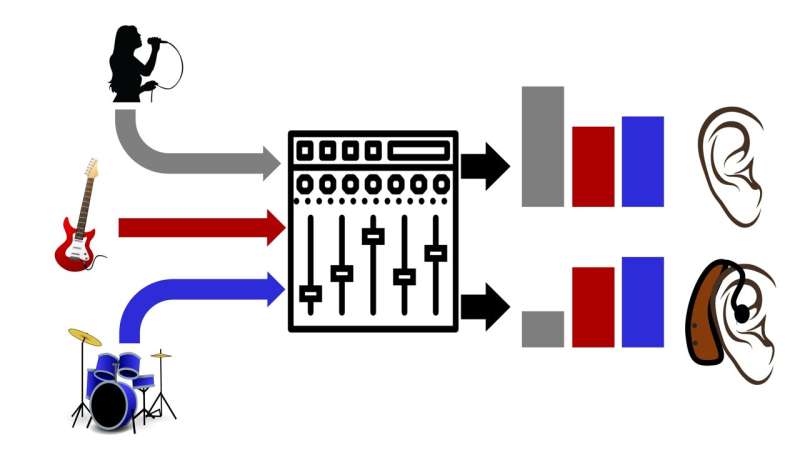This article has been reviewed according to Science X's editorial process and policies. Editors have highlighted the following attributes while ensuring the content's credibility:
fact-checked
peer-reviewed publication
trusted source
proofread
Hard-of-hearing music fans prefer a different sound

Millions of people around the world experience some form of hearing loss, resulting in negative impacts to their health and quality of life. Treatments exist in the form of hearing aids and cochlear implants, but these assistive devices cannot replace the full functionality of human hearing and remain inaccessible for most people. Auditory experiences, such as speech and music, are affected the most.
In The Journal of the Acoustical Society of America, researchers from the University of Oldenburg studied the impact of hearing loss on subjects' enjoyment of different music mixes.
Modern pop or rock music is built from several individual tracks, such as vocals, instruments, and synthesized sounds, all recorded separately and mixed to make the final product. To cater to listener preferences, this mixing might entail raising or lowering the volume of one of the tracks or amplifying the high- or low-frequency sounds.
"Mixing is tailored to suit the needs of normal-hearing listeners," said author Kai Siedenburg. "We wanted to explore whether there are actually differences in mixing preferences between normal-hearing and hard-of-hearing listeners."
To do this, the researchers played different music mixes to listeners with and without hearing loss. They found that those with hearing loss preferred louder lead vocals, higher frequencies, and sparser mixes with fewer frequencies overall.
"Generally, hard-of-hearing listeners have reduced frequency selectivity and impaired level perception," said author Aravindan Benjamin. "They tend to prefer louder levels of lead vocals compared to normal listeners."
Previous research from the group has found that music steadily shifted to quieter vocals and louder instrumentals leading up to 1975 and has remained there, meaning today's music may be less accessible to those with hearing loss.
Use of hearing aids can remedy these issues to a degree, but they are not available to many people with hearing loss and come with their own set of problems. Some users might prefer to adjust their music with software rather than listen to the default mix through hearing aids.
"Getting good headphones, for example, and then playing around with the equalization might be a better approach than trying to squeeze everything through the hardware of the hearing aid," said Siedenburg.
Ultimately, the biggest difference must come from the production side. Sound engineers with access to the individual tracks can make a big difference by making their work more accessible to millions of listeners.
"One approach could be to offer a couple of different mixes, one for the general public and one for people who are moderately hard of hearing," said Siedenburg. "Certain adjustments to the mix might help to cater to the needs of this group of people in a better way."
More information: Exploring level- and spectrum-based music mixing transforms for hearing-impaired listeners, The Journal of the Acoustical Society of America (2023). DOI: 10.1121/10.0020269
Journal information: Journal of the Acoustical Society of America
Provided by American Institute of Physics





















